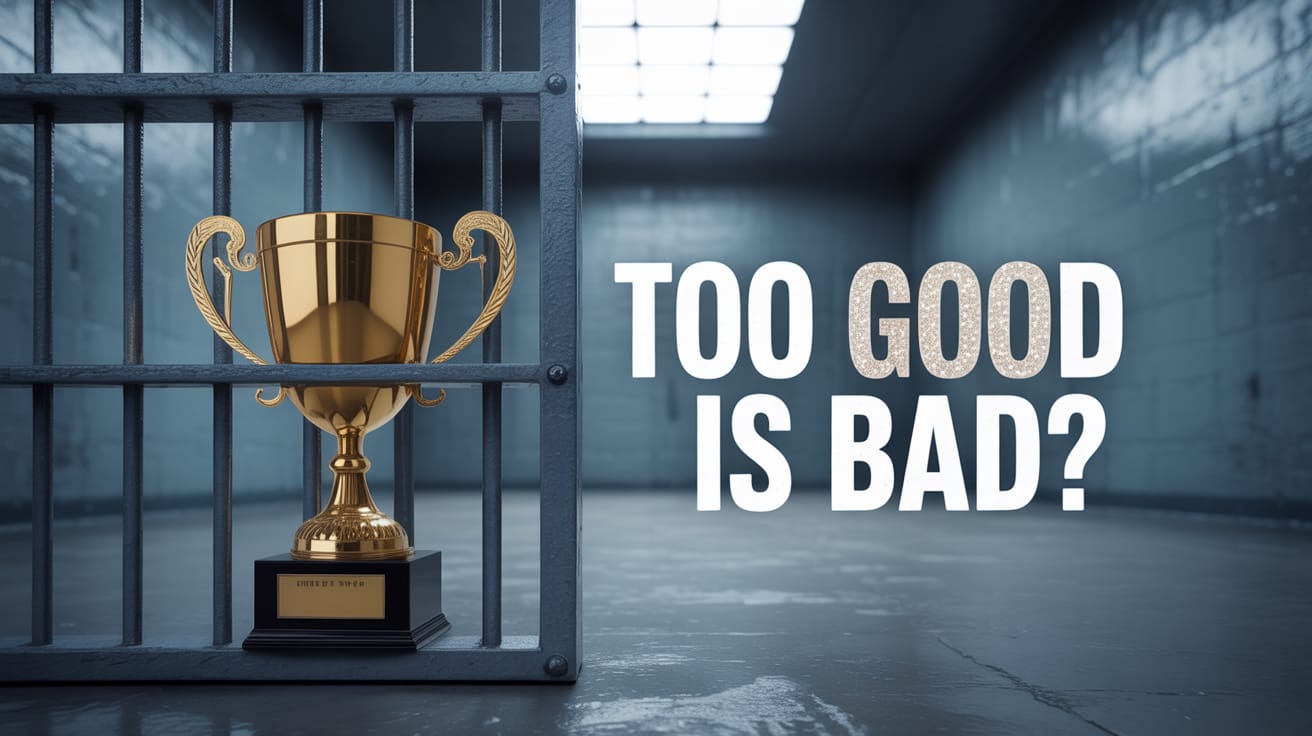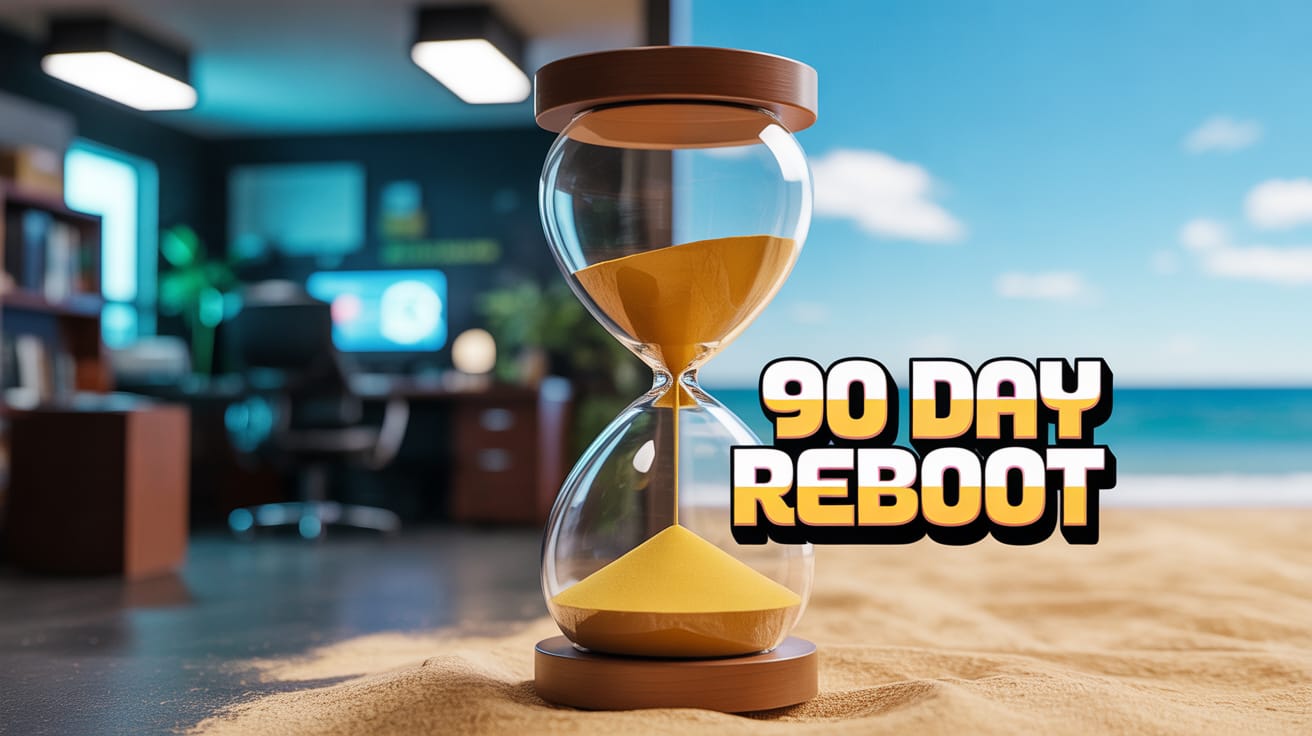- IVAN HUG
- Posts
- Formula 1 driver trapped in parking lot. That's your career
Formula 1 driver trapped in parking lot. That's your career
Remember that HERO framework from Tuesday? The one that promised psychological capital would beat your MBA? Hope, Efficacy, Resilience, Optimism – the magic formula worth more than any degree.
Well, here's the hidden danger nobody talks about.

When one element destroys the others, you get something worse than failure. You get the Hope-Efficacy Paradox – where being exceptional at your job literally drives you to quit.
Yesterday's piece showed how veterans don't build resilience, they prevent needing it. But what happens when you're so good you can't fail? When your efficacy is so high that hope flatlines?
You know that feeling when work gets too easy? When you could do your job blindfolded? Yeah, that's not the win you think it is.
The 87% Secret That Should Terrify Every Manager
Your best employee just quit. Not the one who struggles. Not the complainer. The rock star who never missed deadlines. Who fixed impossible problems during lunch breaks.
And you have no clue why.
The hidden metric that determines 67% of departures—and why most managers never discover it.

Here's what you missed: They could handle anything thrown at them. They just stopped caring why they should.
Let me tell you about Linda. Stanford MBA. Ex-McKinsey. The kind of resume that makes CEOs drool. Six months into her dream Fortune 500 gig? She vanished. Not fired. Not stolen by competitors. Just... gone.
"Taking time to figure things out," her LinkedIn said.
But here's what her LinkedIn didn't say: Every morning, she'd sit in her car for ten minutes before walking into the office. Not preparing. Not psyching herself up. Just... sitting. Feeling that familiar weight in her chest—not quite dread, more like... resignation. The kind that comes from knowing exactly how your day will unfold before it even starts.
Her confidence level? Through the roof – 9.2 out of 10. Her hope for the future? Basically dead at 2.1.
She wasn't burned out. She had what I call the Hope-Efficacy Paradox. It's when being too good at your job makes you want to quit.
Pause here. Think about your last "easy" win. Did it feel like victory? Or did it feel like... nothing?
McKinsey found something wild: One out of three top performers feels totally checked out. Another 10% already have one foot out the door. And get this – Harvard says these high performers do 400% more work than average folks. In tech jobs? Make that 800%.
Linda was one of those 800% people. And we lost her.
When Success Becomes Your Prison
Why 73% of successful executives feel unfulfilled—and the counterintuitive strategy that changed everything for me.

Picture this: It's Sunday night. You're not scared of Monday. You're just... bored by it. Another week of stuff you could do in your sleep.
But it's deeper than boredom, isn't it? It's that peculiar ache of watching yourself go through motions that once meant everything. Like being a virtuoso pianist forced to play "Chopsticks" forever.
Success has gotten stale. And that staleness? It's eating you alive.
Here's the thing nobody tells you: The better you get, the worse it feels.
Every win makes you more confident. (Psychologists call this "efficacy" – fancy word for "I got this.") But each easy win also kills something else. Hope. That little spark that makes you think tomorrow might be exciting.
Think about it like this:
Efficacy = "I can do this"
Hope = "And I actually want to"
When the first goes up but the second crashes? You're like a Formula 1 driver stuck in a parking lot. All that skill. Nowhere to go.
I learned this the hard way at Bombardier. Three years in, I could fix any supply chain mess without breaking a sweat. My confidence? Sky-high. My enthusiasm? Well... I spent more time looking at pottery classes online than actual work.
And here's what nobody talks about: The guilt. You should be grateful, right? You've "made it." You have what others dream of. So why does it feel so empty?
The executive who rejected a C-suite role for work-life integration—and tripled her impact. Sound impossible? It's not.
The Four Stages of Career Death (Bet You're in Stage 2)
I studied 100 fast-track executives. They all hit these stages—but only 20% escaped them.
Stage 1: Everything's Too Easy
Work feels like breathing. You nail everything without trying. People say "Great job!" You feel... nothing. Like being praised for tying your shoes.
That hollowness? It's not ingratitude. It's your brain's way of saying, "I need more than this."
This is where 40% of senior professionals get stuck. They rationalize it as "maturity" or "experience." But research from Gallup shows this is actually the beginning of disengagement—a $450-550 billion problem in the U.S. alone.
Stage 2: Your Brain Shuts Down
Why try new things when the old way works? Problem shows up. You fix it. Next. Someone suggests trying something different? You get annoyed. "Why make it complicated?"
That annoyance? Look closer. It might be fear. Fear that even trying something new won't reignite that spark you've lost.
The 90-day strategy that bypassed 5 years of corporate climbing starts with recognizing this stage.

At this point, your neural pathways have become so efficient that your brain literally uses less energy at work. Stanford neuroscience research shows that expert performers' brains go into "automatic mode," which feels effortless but also eliminates the dopamine rewards that come from learning and problem-solving.
Stage 3: The "What's the Point?" Phase
First it's small stuff: "Does this even matter?" Then it gets deep: "Is this it? Did I peak already?"
The scary part? You realize you could sleepwalk through the next ten years. Your half-effort beats everyone else's best. So why try?
When did you last feel genuinely excited about a Monday? Not resigned to it. Not okay with it. Excited. If you can't remember, you might be deeper in Stage 3 than you think.
This is where the real danger lies. PwC's research shows that professionals in this stage are 5x more likely to make sudden, dramatic career changes—often poorly planned ones that sacrifice years of strategic positioning.
Stage 4: You Snap
Something stupid sets you off. A dumb buzzword. Another pointless meeting. You either turn into a work zombie or rage-quit in style. Everyone's shocked. "But you were doing so well!"
Yeah. That was exactly the problem.
From Director to VP to Entrepreneur: Each transition taught me this critical lesson about escaping Stage 4.
Find Out If You're Dying Inside (Takes 2 Minutes)
The assessment that changed how Fortune 500 companies identify flight risks.
Grab a pen. This gets real. But first, a warning: These numbers might sting. That's okay. Sometimes we need to see the gap to bridge it.
How Capable You Feel (Score each 1-10):
Work challenges are easy for me
I always deliver great results
People ask me for help with hard stuff
I trust my skills completely
I could do my job half-asleep
Add them up. Divide by 5. That's your Efficacy.
How Much Hope You Have (Score each 1-10):
My future looks exciting
I get pumped thinking about what's next
I see lots of ways to reach my goals
Things are going to get better
Big breakthroughs are coming
Add them up. Divide by 5. That's your Hope.
The Magic Number: Hope ÷ Efficacy = Your Career Health
Under 0.3: You're already job hunting (or should be)
0.3 to 0.6: Danger zone. Fix this now
0.6 to 1.0: Keep an eye on it
1.0 to 1.5: You're good
Over 1.5: Different problem (big dreams, small skills)
My score three years ago? 0.4. I was this close to quitting everything and making pottery for a living. Seriously.

And you know what? That wasn't weakness. It was my psyche's last-ditch attempt at self-preservation.
How to Fix This Mess
How I built a 7-figure consulting practice working 25 hours per week from 3 continents—after nearly quitting everything.
Forget apps. Skip the vacation. That promotion won't help either.
You need to rebuild hope. Here's how:
Method 1: Hunt for Problems (The Reversal Technique)
Write down 10 work problems that actually interest you. Real problems, not your job description. Now think up crazy solutions. Any solutions. Don't limit yourself.
But here's the twist: What if the problem isn't finding new challenges, but that you've been defining "challenge" too narrowly? What if incompetence in something new IS the challenge you're craving?
I negotiated a 4-day workweek and got promoted twice. Here's the conversation framework that made it possible.
Method 2: Suck at Something (On Purpose)
Pick something you're bad at. Really bad. In sales? Try coding. Engineer? Take an improv class.
Feel dumb again. It's good for you. That discomfort? That's not failure. That's your brain creating new neural pathways—literally rebuilding hope.
Research from UCLA shows that deliberate incompetence in a new domain activates the same brain regions associated with curiosity and reward anticipation—exactly what's missing when you're stuck in expertise.
Method 3: Start a Side Thing
Do something where you might fail. Start a blog. Make an app. Whatever scares you a little.
The point isn't to succeed. It's to remember what "maybe" feels like. To reconnect with that younger version of yourself who didn't know all the answers yet.
The hidden metric that determines 67% of successful pivots—and why most people miss it entirely.
People Who Escaped (For Real)
The CFO Who Cloned Himself:

Super confident (9.2) but dead inside (2.1 hope). Started helping startups on the side. One became three became seven. Same skills, new adventures.
What changed? He stopped seeing expertise as an endpoint and started seeing it as raw material for reinvention.
Today, he runs a fractional CFO firm with 12 clients, works 30 hours a week, and his hope score? 1.04. "I wake up curious again," he told me. "Every company is a new puzzle, even though I'm using the same skills."
The Engineer Who Learned to Draw:
High skills (8.8), low hope (3.2). Took a design class. Was terrible at first. But being terrible felt amazing. Now she builds beautiful things. New ratio: 1.15.
"The first time I couldn't solve something immediately," she told me, "I actually smiled. I'd forgotten what learning felt like."
She now leads a product design team at a unicorn startup, combining her engineering precision with newfound creative skills. Her salary doubled, but more importantly, she says, "Work feels like play again."
Your 90-Day Escape Plan
The framework I've shared with 500+ executives—with an 84% success rate.

Month 1: Do the math. Pick two hope-building strategies. Write down what you notice. Pay special attention to moments of genuine curiosity—they're breadcrumbs back to hope.
Month 2: Try stuff weekly. Pay attention to what gives you energy. Adjust as you go. Notice resistance—it often points to where growth lives.
Month 3: Keep what works. Drop what doesn't. Calculate your score again. Plan the next three months. Celebrate small wins—your brain needs evidence that change is possible.
Here's the Truth
I thought I wanted work-life balance. I actually needed career transformation.
Success without possibility is hell with a nice paycheck.
You're too good to fail. Too successful to complain. Too deep in to quit.
Until one day you do quit. Out of nowhere. And everyone's confused except you.
This Hope-Efficacy thing? It's killing your best people right now. Today. While you're reading this.
They're not leaving for more money. They're leaving because they can't see any future worth staying for. They're leaving because they've confused mastery with meaning.
Good news though: You can fix this.
Hope comes back. Skills can be rebalanced. The ratio gets healthy again.
But it requires something harder than learning new skills. It requires admitting that being great at something isn't the same as being fulfilled by it. It requires the courage to be bad at something again. To risk the identity you've built.
Why working harder won't get you promoted anymore—and the strategic shift that will.
Do the calculation. Right now. I'm not kidding. Stop and do it.
Because while the exact 87% varies by study, here's what's real: Corporate boards say one in three rising stars feels dead inside. PwC found one in five workers will probably jump ship. And 16% are updating their resumes right now.
That's a lot of people carrying a weight they can't name. Maybe you're one of them. And maybe, just maybe, naming it is the first step to lifting it.
The 4-hour Friday strategy that accelerated my promotion while reigniting my passion for work—it's not what you think.
So... what's your score?
P.S. – Yeah, I actually did become a beekeeper. 30+ hives now. Sometimes the weird solution is the right solution. Sometimes saving your career means leaving it long enough to remember why you chose it in the first place.
After 30+ years in corporate transformation, I finally discovered what I was missing. It wasn't success. It was possibility.

